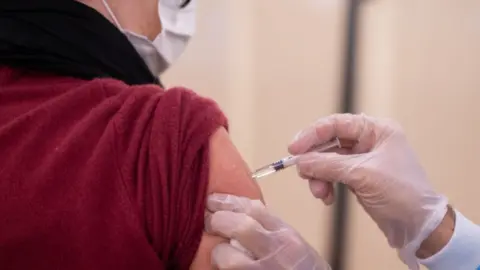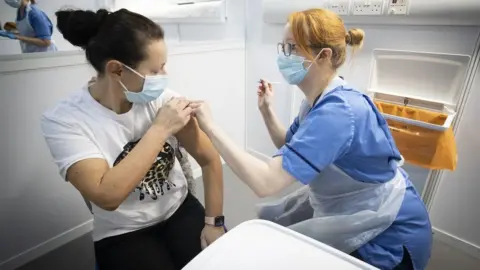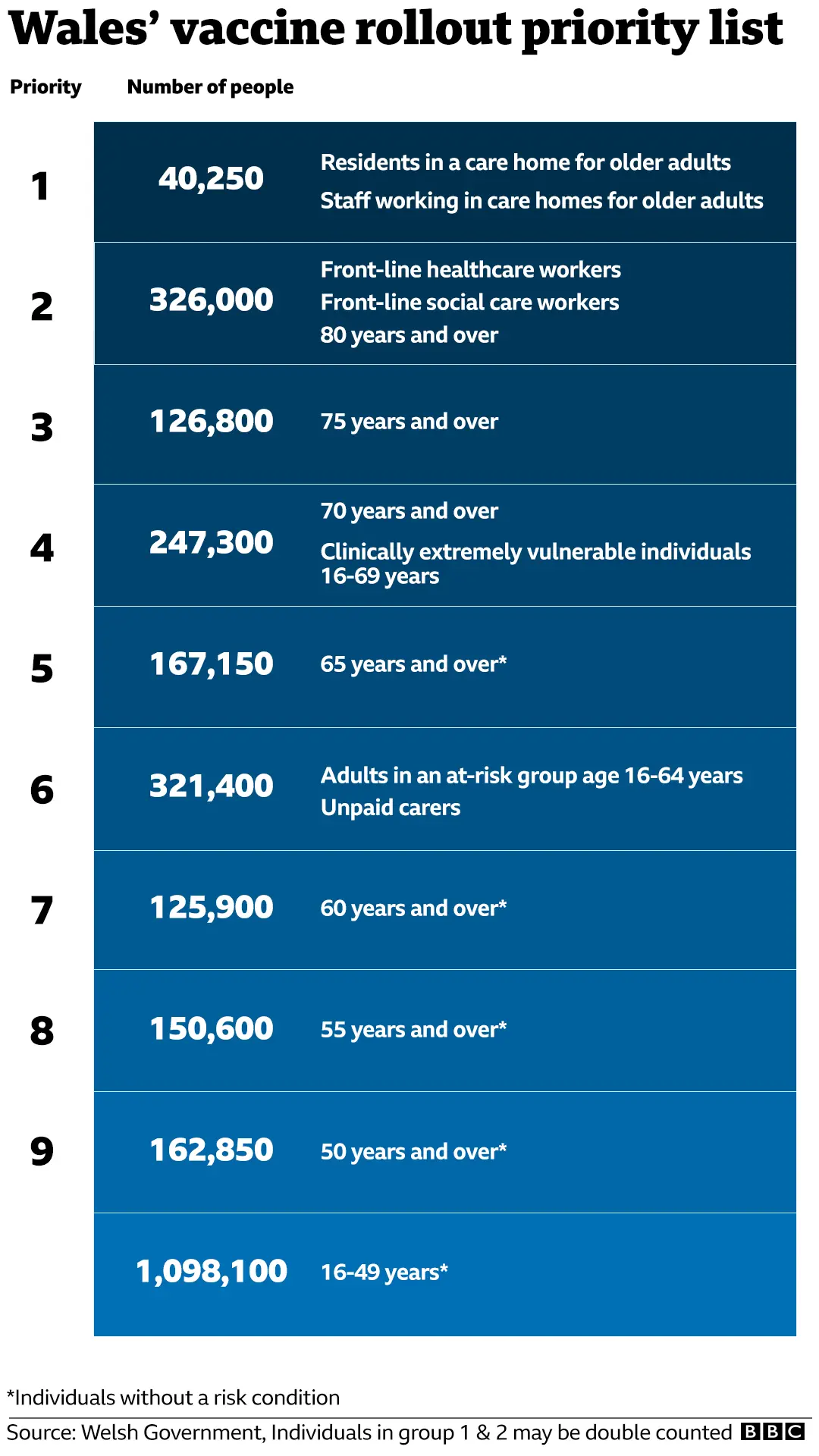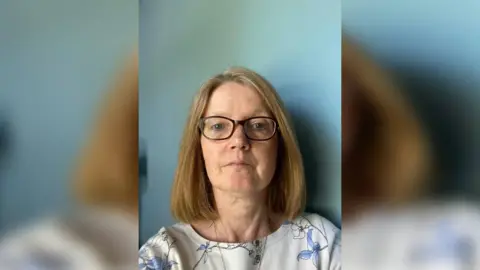Covid vaccines and blood clots: Your questions answered
 Getty Images
Getty ImagesMisinformation about Covid vaccine risks and concerns over rare blood clots have had many searching the web for answers.
Thrombosis UK, which has its headquarters in Carmarthenshire, has also received queries from people with a history of blood clots.
Some asked whether they should have the vaccine at all, others if they should be given a different second dose.
Here the charity and Public Health Wales answer the most frequently asked questions.
I have a history of blood clots - am I at increased risk?
 Jo Jerrome
Jo JerromeJo Jerrome, chief executive of Thrombosis UK: "Having a previous thrombosis or thrombophilia (sticky blood) is not a risk factor for developing the rare post-Covid-19 vaccine thrombosis and thrombocytopenia."
Public Health Wales: "Following reports of an extremely rare and specific blood clot after vaccination with the AstraZeneca Covid-19 vaccine, the Medicines and Healthcare Regulatory Agency (MHRA) and the Joint Committee on Vaccination and Immunisation (JCVI) confirmed on 7 April 2021 that this type of blood clot with low platelets (sticky cells) are a possible side effect of the vaccine.
"However, they continue to advise that the benefits of vaccination with the AstraZeneca Covid-19 vaccine continue to outweigh the risks of Covid-19 for the vast majority of adults.
"Public Health Wales is aware of one confirmed case of this extremely rare type of clot in Wales after receiving AstraZeneca Covid-19 vaccine among over one million people who have received that vaccine.
"The expert scientific advice from the JCVI is that risk benefit remains strongly in favour of vaccination with the AstraZeneca vaccine for those aged 30 and over, and those aged under 30 who have underlying health conditions which puts them at higher risk of severe outcomes from Covid-19 infection."
Should I have the AstraZeneca vaccine?
Jo Jerrome, chief executive of Thrombosis UK: "The Joint Committee on Vaccines and Immunisation and Expert Haematology Panel have advised that anyone with a history of blood clots are at no increased risk from the AstraZeneca Covid-19 vaccine."
Public Health Wales: "Public Health Wales supports the expert scientific advice of UK expert groups that the benefits of vaccination with all Covid-19 vaccines in use continue to outweigh the risks of Covid-19.
"Covid-19 has caused over 120,000 deaths in the UK, with an average of 30 deaths a day still being reported. The vaccination programme has already saved over 6,000 lives."
Should I have the second AstraZeneca jab?
Jo Jerrome, chief executive of Thrombosis UK: "There are no known cases of the rare thrombosis with thrombocytopenia reported after a second dose of the AstraZeneca vaccine.
"The Joint Committee on Vaccines and Immunisation, Expert Haematology Panel and Medicines Healthcare and Products Regulatory Agency, all advise that if a person has received their first dose of the AstraZeneca Covid-19 vaccine and did not develop vaccine-associated blood clots, then they are advised to attend for their second AstraZeneca vaccine when invited.
"Although research is ongoing, there is currently no evidence to indicate the benefit or risks of mixing Covid vaccines."
Public Health Wales: "Those who have received a first dose of the AstraZeneca vaccine, irrespective of age, should continue to receive a second dose.
"To date there have been no confirmed cases of the extremely rare and specific blood clots after receiving the second dose of the vaccine."
What side effects should I look out for after the vaccine?
 PA Media
PA MediaJo Jerrome, chief executive of Thrombosis UK: "Although serious side effects are very rare, if you experience any of the following from around four days to four weeks after vaccination you should seek medical advice urgently."
- a new, severe headache which is not helped by usual painkillers or is getting worse
- a headache which seems worse when lying down or bending over
- an unusual headache that may be accompanied by:
- blurred vision, nausea and vomiting
- difficulty with your speech
- weakness, drowsiness or seizures
- new, unexplained pinprick bruising or bleeding
- shortness of breath, chest pain
- leg swelling
- persistent abdominal pain
Public Health Wales: "Common side effects after vaccination are normal and expected. For all approved vaccines in the UK, these side effects can include a sore arm, feeling tired, headache, mild aches or flu like symptoms, and a mild fever that normally last up to two or three days after vaccination.
"If an individual experiences the [additional] symptoms starting four days to four weeks after the vaccine, they should seek medical care promptly.
"Public safety remains at the forefront of our concerns and MHRA will continue to monitor vaccine safety working closely with JCVI and this issue will be kept under review.
"Vaccination remains the best way to protect yourself against Covid-19 disease."
I am over 30 and have a history of blood clots - is the AstraZeneca vaccine safe for me?
Jo Jerrome, chief executive of Thrombosis UK: "All current scientific bodies studying and monitoring reported blood clots following the AstraZeneca vaccine (Joint Committee on Vaccines and Immunisation and Expert Haematology Panel) have advised that anyone with a history of blood clots are at no increased risk from the AstraZeneca Covid-19 vaccine."
Public Health Wales: "The expert scientific advice from the JCVI is that risk benefit remains strongly in favour of vaccination with the AstraZeneca vaccine for those aged 30 and over, and those aged under 30 who have underlying health conditions which puts them at higher risk of severe outcomes from Covid-19 infection."
Should I take some aspirin before and after the vaccination?
Jo Jerrome, chief executive of Thrombosis UK: "Expert haematologists advise against taking aspirin after AstraZeneca Covid-19 vaccine because it will not affect the occurrence of the very rare vaccine-associated thrombosis and thrombocytopenia (VATT), which is driven by an immune response to something in the AstraZeneca Covid-19 vaccine.
"Furthermore, one of the problems with VATT is a low platelet count which means there is increased risk of bleeding. Aspirin will make this worse.
"Outside of VATT in healthy people, aspirin's bleeding problems outweigh any benefits in reducing clots. Aspirin does have enormous benefit in reducing risk of further arterial clots however, in those who have had clots."
Public Health Wales: "Public Health Wales does not support taking aspirin before and after the vaccination, any concerns should be discussed with your GP ahead of your vaccination."

I had a blood clot a few years ago - should I ask to be anticoagulated before the vaccination?
Jo Jerrome, chief executive of Thrombosis UK: "All evidence and current guidance advises that people with a history of blood clots are at no increased risk and the benefits for most, especially those above the age of 30, of having a Covid vaccination outweigh the risk of this very rare syndrome.
"However, if an individual has concerns or is uncertain, they should speak to their GP."
Public Health Wales: "Public Health Wales advises that anyone with a history of a blood clot should speak to their GP ahead of their vaccination."
Can I switch to another vaccination other than AstraZeneca?
Jo Jerrome, chief executive of Thrombosis UK: "Current advice is no. There is no evidence to show the benefits or risks in switching vaccines in those with no increased risk from a vaccine (ie those who have not suffered a vaccine-associated thrombosis and thrombocytopenia).
"All scientific and regulatory bodies in the UK are advising that if you have had a first dose AstraZeneca Covid vaccine and not experienced a VATT, you are advised to attend for the second dose when invited.
"If you have concerns due to suffering an extreme adverse reaction after your first dose, you should speak with your GP."
Public Health Wales: "You cannot chose which of the vaccines you receive but all three have been approved by the UK medicines regulator as effective and safe.
"You can choose whether to have the vaccine or not. You will receive information about the jab to help you make up your mind if you have any concerns."
I am under 30 and have a history of blood clots. Which vaccine will I get?
Jo Jerrome, chief executive of Thrombosis UK: "The regulatory authorities in the UK have advised that anyone under the age of 30 years who has not yet had their Covid vaccination should be considered for an alternative [to AstraZeneca]."
Public Health Wales: "JCVI advise that adults aged 18 to 29-years-old who do not have underlying health conditions should be offered an alternative vaccine balancing risks and benefits.
"Health boards in Wales will be offering alternative vaccines to this group, while continuing to offer all available vaccines at all other ages."

'I was happy to have the vaccine'
 Astrid Ullrich
Astrid UllrichAstrid Ullrich, 55, from Swffryd in Blaenau Gwent has a history of blood clots, but said it did not stop her from getting the vaccine to protect her from Covid-19.
"I had one blood clot when I was 18 and the second one was 28 years later, so I am on anticoagulants for life," she said.
"I am happy having the vaccine because I know that there are some cases of blood clots... but they don't know yet why it happens.
"In my personal opinion, it's safer to have the vaccine than having Covid, so I was relaxed about it. I've had both jabs now."
